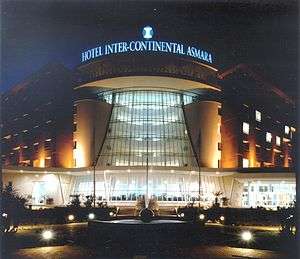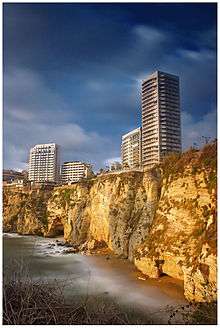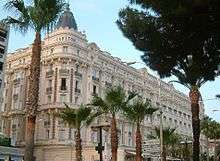InterContinental
| Industry | Hotels |
|---|---|
| Founded | 1946 |
| Founder | Juan Trippe |
Number of locations | 180 hotels & resorts |
Area served | Global |
| Parent | InterContinental Hotels Group |
| Website |
ihg |
InterContinental Hotels & Resorts has over 180 hotels, located in more than 60 countries across the globe. In operation for over 60 years, the Intercontinental brand is one of the world’s major luxury hotel and resort brands.
History
In 1946, InterContinental Hotels & Resorts was introduced from Pan Am's vision of mass international air travel, with the first hotel opening in Belém, Brazil to accommodate crews and passengers in destinations where upscale hotels were not yet present.
The brand was thought up of by United States President Franklin Delano Roosevelt, and Juan Terry Trippe, former President of Pan American Airways. At a White House breakfast in 1945, the two men discussed their concern for Latin America’s need for development dollars. The men thought that one way to attract businessmen and tourists would be to offer luxury hotels. Trippe agreed that Pan Am, with the support of U.S. government institutions as the Export-Import Bank, could form a subsidiary to foster the implementation of the idea. On April 3, 1946, Intercontinental Hotel Corporation was legitimized. Today, InterContinental Hotels & Resorts operates globally, with 37 properties in North America, compared to 31 in Europe, 29 in the Middle East, 19 in Latin America and 51 in Asia Pacific.
Key history timeline
1960s InterContinental Hotels & Resorts was the first international hotel chain to open a property in the Middle East – in 1961 InterContinental Phoenicia Beirut opened in Lebanon.
1970s In 1973 InterContinental Hotels & Resorts opened its first hotel in the U.S. – InterContinental Mark Hopkins San Francisco.
1980s During the 1980s, 70 InterContinental Hotels & Resorts opened, including the InterContinental Amstel Amsterdam in the Netherlands, the InterContinental Paris Le Grand in France, the Willard InterContinental Washington D.C., and the InterContinental Seoul in South Korea.
2000s In 2008 InterContinental Hotels & Resorts opened the InterContinental Beijing Beichen and the InterContinental Qingdao in China in celebration of the 2008 Olympic Games.
Awards
World Travel Awards 2014
InterContinental Hotels & Resorts was named "The World’s Leading Hotel Brand" for the sixth consecutive year at The World Travel Awards 2014.
Individual InterContinental Hotels & Resorts also won over forty accolades At World Travel Awards ceremonies around the globe.
It also received awards in other areas as well.
Business Traveller Awards 2014
InterContinental Hotels & Resorts was named "Best Hotel Brand Worldwide" at The Business Traveller Middle East Awards 2014.
Individual InterContinental Hotels & Resorts properties also won accolades at various Business Traveller Awards Ceremonies around the world.
Responsible business
InterContinental Hotels & Resorts use the IHG Green Engage system, an online sustainability management system that tracks a hotel’s environmental performance and recommends ways to improve it. The hotel chain also uses Green Engage tools to help their hotels and resorts reduce energy consumption by up to 25%. Its Shelter in a Storm program involves the receipt of guidance on when and how best to respond when disasters occur. When a disaster occurs, funds from the IHG Shelter Fund can be allocated to enable hotels to support their guests, employees and the local community with financial support, supplies and accommodation. The brand also operates an IHG Academy that schools local people to develop skills for work.
Notable properties
Africa
- InterContinental City Stars, Cairo, Egypt
- InterContinental Asmara, Asmara, Eritrea
- InterContinental Sandton Towers, Sandton, Johannesburg, South Africa
- InterContinental Mauritius, Balaclava, Mauritius
- InterContinental Nairobi, Nairobi, Kenya
- InterContinental Lagos, Lagos, Nigeria
- InterContinental Lusaka, Lusaka, Zambia
Asia
- InterContinental Dhaka, Dhaka, Bangladesh
- Grand InterContinental Seoul Parnas, Seoul, South Korea
- InterContinental Asiana Saigon, Ho Chi Minh City, Vietnam
- InterContinental Bangkok, Bangkok, Thailand
- InterContinental COEX, Seoul, South Korea
- InterContinental Dalian, People's Republic of China
- InterContinental Danang Sun Peninsula Resort, Danang, Vietnam
- InterContinental Grand Stanford, Hong Kong, Hong Kong
- InterContinental Manila, Makati, Philippines
- InterContinental Chengdu, Chengdu, People's Republic of China
- InterContinental Chongqing, Chongqing, People's Republic of China
- InterContinental Hangzhou, Hangzhou, People's Republic of China
- InterContinental Hanoi Westlake, Hanoi, Vietnam
- InterContinental Hong Kong, Hong Kong
- InterContinental Alpensia Pyeongchang Resort, Pyeongchang, Gangwon-do, South Korea
- InterContinental Hotel The Grand, Yokohama, Japan
- InterContinental Huizhou, Huizhou, People's Republic of China
- InterContinental Ishigaki, Okinawa, Japan
- InterContinental Hotel Kabul, Kabul, Afghanistan
- InterContinental Kuala Lumpur, Kuala Lumpur, Malaysia
- InterContinental Manza Beach, Okinawa, Japan
- InterContinental Marine Drive Mumbai, Mumbai, India
- InterContinental Bandung Dago Pakar, Bandung, Indonesia
- InterContinental Mid-Plaza, Jakarta, Indonesia
- InterContinental Pondok Indah Jakarta, Indonesia (opening 2016)
- InterContinental Nanjing, Nanjing, People's Republic of China
- InterContinental Nha Trang, Nha Trang, Khanh Hoa, Vietnam
- InterContinental Phnom Penh, Phnom Penh, Cambodia
- InterContinental Resort Bali, Jimbaran, Bali, Indonesia
- InterContinental Samui Baan Taling Ngam, Koh Samui, Thailand
- InterContinental Shanghai Pudong, Shanghai, People's Republic of China
- InterContinental Suzhou, Suzhou, People's Republic of China
- InterContinental Singapore, Singapore
- InterContinental, The Grand, Delhi, India
- InterContinental Tokyo, Tokyo, Japan
- InterContinental Tokyo Bay, Tokyo, Japan
- Shimao Wonderland Intercontinental, Songjiang, China
- InterContinental Hua Hin, Hua Hin, Thailand
Central America
- Real InterContinental Guatemala, Guatemala City, Guatemala
- Real InterContinental San Salvador, San Salvador, El Salvador
- Real InterContinental Tegucigalpa, Tegucigalpa, Honduras
- Real InterContinental San Pedro Sula, San Pedro Sula, Honduras
- Real InterContinental Metrocentro Managua, Managua, Nicaragua
- Real InterContinental Hotel & Club Tower Costa Rica, San José, Costa Rica
- InterContinental Miramar Panama, Panama City, Panama
- InterContinental Playa Bonita Resort & Spa, Panama City, Panama
Europe
- InterContinental Amstel Amsterdam, Amsterdam, the Netherlands
- Athenaeum InterContinental, Athens, Greece
- InterContinental Budapest Hotel, Budapest, Hungary
- InterContinental Bucharest, Bucharest, Romania
- InterContinental Berlin, Berlin, Germany
- InterContinental Carlton Cannes, Cannes, France
- InterContinental Paris Le Grand, Paris, France
- InterContinental Düsseldorf, Düsseldorf, Germany
- InterContinental Frankfurt, Frankfurt am Main, Germany
- InterContinental Geneva, Geneva, Switzerland
- Ceylan InterContinental Istanbul, Istanbul, Turkey
- InterContinental La Torre, Murcia, Spain
- InterContinental London Park Lane Hotel, London, United Kingdom
- InterContinental London Westminster, London, United Kingdom
- InterContinental Malta, St. Julian's, Malta
- InterContinental Marseille Hotel Dieu, Marseille, France
- InterContinental Moscow Tverskaya, Moscow, Russian Federation
- InterContinental Porto, Porto, Portugal
- InterContinental Praha, Prague, Czech Republic
- InterContinental Warsaw, Warsaw, Poland
- InterContinental Kyiv, Kiev, Ukraine
- InterContinental at Aphrodite hills, Paphos, Cyprus
- InterContinental Vienna, Vienna, Austria
- InterContinental Estoril, Estoril, Portugal
- InterContinental Hotel Dieu - Lyon, Lyon, France (opening in 2017)
Middle East
- InterContinental Mzaar, Faraya, Lebanon
- Phoenicia InterContinental Hotel, Beirut, Lebanon
- Dar Al Tawhid InterContinental, Makkah, Saudi Arabia
- David InterContinental Tel Aviv, Tel Aviv, Israel
- InterContinental Abu Dhabi, Abu Dhabi, United Arab Emirates
- InterContinental Al Jubail, Jubail, Saudi Arabia
- InterContinental Al Khobar, Khobar, Saudi Arabia
- InterContinental Kingdom of Bahrain, Manama, Bahrain
- InterContinental Amman, Amman, Jordan
- InterContinental Aqaba, Aqaba, Jordan
- InterContinental Dubai Festival City in Dubai, United Arab Emirates
- InterContinental Dubai Marina in Dubai, United Arab Emirates
- Intercontinental Hotel, Doha, Qatar
- InterContinental Jericho, Jericho, West Bank
- InterContinental Le Vendôme, Beirut, Lebanon
- InterContinental Riyadh, Riyadh, Saudi Arabia
- Dar Al Iman InterContinental, Madinah, Saudi Arabia
- InterContinental Muscat, Muscat, Sultanate of Oman
North America
- InterContinental Buckhead, Atlanta, Georgia, United States
- InterContinental Los Angeles, Century City, California, United States
- InterContinental Kansas City at the Plaza, Missouri, United States
- InterContinental Boston, Massachusetts, United States.
- InterContinental The Barclay, New York City, New York, United States
- InterContinental Time Square, New York City, New York, United States
- InterContinental Chicago, Illinois, United States
- InterContinental Cleveland, Ohio, United States
- InterContinental Dallas, Texas, United States
- InterContinental at Doral Miami, Florida, United States
- InterContinental Miami, Florida, United States
- InterContinental Mark Hopkins San Francisco, Nob Hill, San Francisco, California, United States
- InterContinental San Francisco, California, United States
- InterContinental Milwaukee, Wisconsin, United States
- InterContinental New Orleans, Louisiana, United States
- Willard InterContinental Washington, Washington, D.C., United States
- InterContinental The Clement Monterey, California, United States
- InterContinental Presidente Monterrey, Monterrey, Mexico
- InterContinental Presidente Puebla, Puebla, Mexico
- InterContinental Presidente, Mexico City, Mexico
- InterContinental Toronto Centre, Ontario, Canada
- InterContinental Toronto-Yorkville, Ontario, Canada
- InterContinental Montreal, Quebec, Canada
- InterContinental Stephen F. Austin, Austin, Texas, United States
South America
- InterContinental Cali, Cali, Colombia
- InterContinental Medellín, Medellín, Colombia
- InterContinental Caracas, Caracas, Venezuela
- InterContinental Maracaibo, Maracaibo, Venezuela
- InterContinental Buenos Aires, Buenos Aires, Argentina
- InterContinental Santiago de Chile, Santiago de Chile, Chile
- InterContinental Mendoza, Mendoza, Argentina
Oceania
- InterContinental Adelaide, Adelaide, Australia
- InterContinental Melbourne the Rialto, Melbourne, Australia
- InterContinental Sydney, Sydney, Australia
- InterContinental Sydney Double Bay Sydney, Australia
- InterContinental Wellington, Wellington, New Zealand
- InterContinental Sanctuary Cove Resort, Sanctuary Cove, Queensland, Australia
- InterContinental Le Moana Spa and Resort, Bora Bora, French Polynesia
- InterContinental Bora Bora and Thalasso Spa, Bora Bora, French Polynesia
- InterContinental Tahiti Resort & Spa, Tahiti, French Polynesia
Gallery
References
Please see below for links.
External links
| Wikimedia Commons has media related to InterContinental hotels. |
| ||||||||||||||||||||||||||||||||||||||||||||||||||||||||||||||||||||||||||||||||||



















